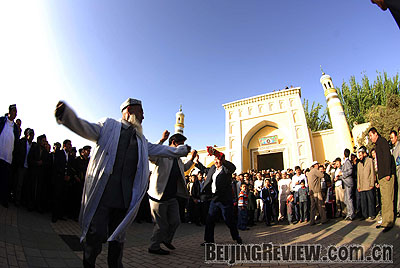| 
FESTIVAL CELEBRATION: Kashi residents celebrate the Fast-Breaking Festival on October 2 by dancing in the Id Kah Plaza
The city is close to China's border with India in the south and central Asia to its west. Marco Polo (1254-1324), one of the first Westerners to travel to China along the Silk Road, once described Kashi as the "Cairo of the East."
A terrorist attack erupted on the morning of August 4 this year, when terrorists attacked a group of border policemen jogging in Kashi. Using a dump truck, homemade grenades and knives, they killed 18.
Three months have passed since August when nightmare haunted the city, and life is gradually brought to normal. Cheng Gang, a correspondent with the Beijing-based Global Times made a trip to Kashi in October. Below are excerpts from his account of the journey.
Business as usual
The plane landed at Kashi airport after midnight Beijing time. As Kashi is the western-most city in China, because of the time difference, it was only 10:30 p.m. local time. At the airport the crowds were boisterous. Some came to pick up relatives or friends, some were expecting tour groups, and taxi drivers were waiting for customers. Almost all the flights from Urumqi to Kashi arrived around the same time causing a flood of people. The atmosphere was that of a thriving city. It seemed like the riot that took place a few months before had not shrouded the city in tension, let alone terror.
I took a taxi through clean streets lit by pretty lamps and passed an evening market packed with people. The driver said, "The attack had an impact on people's perception of Xinjiang from outside the region. The number of visitors coming here has dropped. This should be the peak travel season in Kashi, when it's hard to find a vacant hotel room. But for local residents like me life goes on as usual.
"We know what those extremists were attempting to achieve, and we know they won't get what they want. On August 4, the day of the attack in Kashi, people still went to work or to school as usual. We were angry, but not afraid. In all these years, Kashi has been a fairly safe place overall."
| 